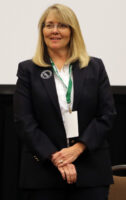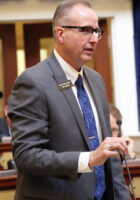The House Education Committee voted Tuesday to send a legislative interim committee back to work for a third consecutive year of studying Idaho’s school funding formula.
The Public School Funding Formula Interim Committee has spent two years studying Idaho’s complicated, attendance-based formula that drives the flow of state money to public schools and charters. Last year, the committee recommended Idaho repeal its average daily attendance model and switch to a student-centric enrollment based funding model.
However, the committee stopped short of developing the specific details of a new formula, such as weighting factors to apply to student groups.

Rep. Wendy Horman, co-chair of the interim funding committee, said the group needs another year of work to meet with Idahoans across the state, develop more feedback, learn from other states that have had success with similar changes and then, finally, develop a specific recommendation.
“We’re not on the Mayflower here,” Horman said. “Most states in the country have already moved to this type of system.”
Horman stressed the magnitude of change is huge and the committee wants to thoroughly study the issue and simulate funding changes before pushing ahead, which is why the work will stretch over three years. Horman said the committee is committed to supporting funding for a fifth year of raises for educators under the career ladder while transitioning to a new funding formula.
But there are many other variables that need to be ironed out or even changed. Horman said the committee might recommend changes to the timing and frequency of payments to school districts. The committee also still needs to develop base funding levels per-student and pair that with a system of funding weights for students with special needs, students who are learning English or students who live in poverty.
The committee may also recommend “collapsing” several of the line items in the public school budget and rolling those into the new funding formula while preserving some other line items, potentially for facilities, technology and transportation.
Committee members posed several questions to Horman before voting unanimously to approve a new House concurrent resolution to put the committee back to work.
Committee members asked about funding formulas used in other states, the proliferation of local school district supplemental levies, the funding weighting system and deadlines.
After Rep. Paul Amador, R-Coeur d’Alene, asked when the committee would have a more specific recommendation, Horman said her goal is to bring a recommendation to the 2019 Legislature.
The concurrent resolution next heads to the House floor for consideration.
Electioneering bill heads to House floor
A compromise bill on electioneering is headed to the House floor.
The House State Affairs Committee approved a rewrite of Rep. Jason Monks’ “Public Integrity in Elections Act.” The bill would prohibit public officials from using taxpayer dollars or taxpayer resources to campaign for or against a candidate or ballot measure.
Monks pushed a similar bill through the House in 2017, but it stalled in the Senate. This time around, the Nampa Republican has picked up support from some of his opponents.
The Idaho School Boards Association opposed the 2017 bill but was “instrumental” in the rewrite, Monks said Tuesday. And in Tuesday’s hearing, ISBA policy and government affairs director Quinn Perry said the bill strikes a good balance; it sets up an “ethical boundary” for public officials, but still allows trustees and school officials to discuss proposed ballot measures with their patrons.
The ISBA is one of several lobbying groups on board with the new bill; the Association of Idaho Cities, the Idaho Farm Bureau and the Idaho Freedom Foundation also testified in favor of the bill Tuesday. The American Civil Liberties Union opposes the bill.
With House State Affairs’ support, the rewritten bill could come up for a floor vote by the end of the week. The bill has not yet been assigned a number.
Bonding bill gets yanked
A bill to require school districts and local governments to disclose the cost of ballot measures was pulled Tuesday.

Sponsored by Rep. Ron Nate, House Bill 560 was scheduled for a floor vote Tuesday. But the bill was yanked off the House calendar and returned to the House Revenue and Taxation Committee — a parliamentary move that could mean the bill is dead for the session.
HB 560 would add 72 words to the Idaho ballot — requiring local governments to outline how much a bond issue or levy would add to a voter’s property tax bill.
While HB 560 might well be dead, the issue might not be done for the session. Nate is scheduled to bring another bill to Revenue and Taxation Wednesday; according to the committee’s agenda, the bill addresses “elections to authorize bonded indebtedness.” The bill is not yet public — and won’t become public until the committee discusses it Wednesday.
STEM diploma bill passes Senate
The Senate gave overwhelming support to a bill to create an Idaho “STEM diploma.”
Sponsored by Sen, Bob Nonini, R-Coeur d’Alene, the diploma designation would recognize students who take additional classes in the STEM disciplines of science, technology, engineering and math.
Senate Bill 1267 passed Tuesday on a 34-1 vote, with Sen. Jim Rice, R-Caldwell, casting the lone dissenting vote. SB 1267 heads to the House.
Ybarra addresses Idaho Commission on Hispanic Affairs
Superintendent of Public Instruction Sherri Ybarra said Tuesday she is committed to closing education gaps and helping Latino students further their education.
Ybarra delivered a keynote speech at the Idaho Commission on Hispanic Affairs’ legislative reception at the Idaho Education Association offices in Boise.
Ybarra highlighted two priorities. First, she said members of the Joint Finance-Appropriations Committee set aside $1 million to benefit students who are learning English.
“We do have some more work to do to ensure more students graduate and go on,” Ybarra said. “We see some of the largest gaps in academic achievement with English language learners, and we don’t deny that.”
Ybarra also said the State Department of Education is launching a new system designed to cut down on paperwork and wait times to be classified as a migrant student.
Ybarra said supporting the Hispanic community and closing education gaps are personal issues for her, not political planks. While working as a teacher and principal in Mountain Home, Ybarra said she worked at a school with high poverty populations and a Latino population of about 60 percent.
Additionally, Ybarra’s husband, Matthew, is Latino and their son shares that heritage.
“At the dinner table, I face a very real and different kind of accountability every night than asking voters statewide to vote for me,” Ybarra said of her family.
About 100 people attended the reception. The audience included University of Idaho President Chuck Staben; Horman and fellow Reps. Kelley Packer, R-McCammon, Van Burtenshaw, R-Terreton, and Clark Kauffman, R-Filer.
Idaho Education News reporter Kevin Richert contributed to this report.
